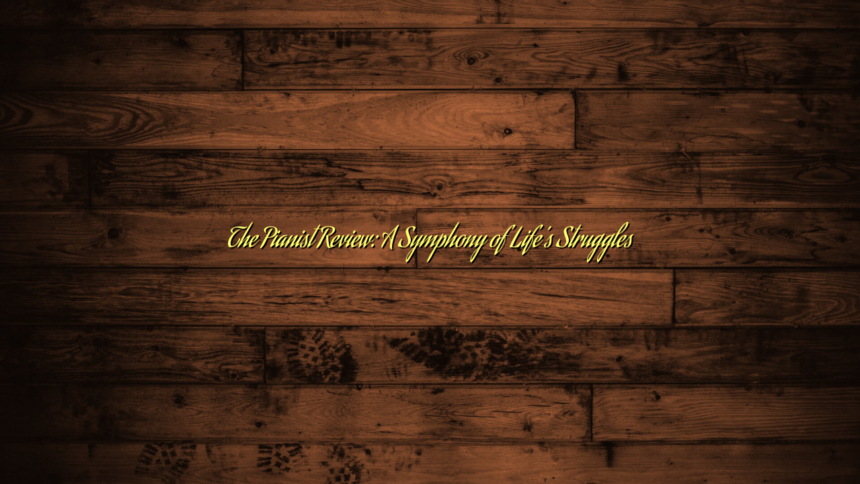The Pianist Review
After we consider classical music, we regularly envision grand live performance halls and virtuoso performances. However what occurs after we pair this elegant artwork kind with harrowing tales of survival? In ‘The Pianist’, a strong movie directed by Roman Polanski, the intricacies of a musician’s life intertwined with the barbarity of struggle remind us of the indomitable human spirit within the face of unimaginable adversity. On this article, we’ll delve right into a complete evaluate of ‘The Pianist’, exploring its themes, character improvement, and the underlying message that resonates lengthy after the credit roll.
A Temporary Overview
The Pianist, launched in 2002 and primarily based on the autobiography of Polish-Jewish pianist Władysław Szpilman, stars Adrien Brody in a riveting efficiency that earned him an Academy Award for Finest Actor. Set in opposition to the backdrop of World Struggle II, the movie chronicles Szpilman’s heart-wrenching journey of survival amid the horrors of the Nazi regime in Poland. This ‘Pianist evaluate’ will look at the cinematic methods, storytelling, and emotional depth that elevate this movie to a timeless masterpiece.
The Historic Context
Understanding the historic context of The Pianist is essential for viewers who wish to grasp the depth of the movie’s emotional expertise. The story unfolds in Warsaw in the course of the Nineteen Thirties and Forties, as town transforms from a cultural hub into the epicenter of Nazi oppression.
The Rising Tensions
The early scenes set a tone of cultural richness, showcasing Warsaw’s vibrant Jewish group. Nevertheless, because the Nazis acquire energy, the viewer is thrust right into a grim actuality the place oppression turns into the norm. The movie does a superb job of contrasting the great thing about music with the brutal actuality of struggle and displacement.
The Destruction of Innocence
Because the movie progresses, we witness the gradual dehumanization of Jews, portrayed by the harrowing experiences of Szpilman and his household. The pianist’s life is thrown into turbulence as he navigates the lack of his household and the destruction of the world he as soon as knew. This theme of misplaced innocence underscores the tragic undercurrents that permeate the movie and elevate it past mere cinematic storytelling.
Character Improvement: The Coronary heart of the Story
One of many hallmarks of The Pianist is its deeply humanized portrayal of its characters—significantly Władysław Szpilman.
Władysław Szpilman
Adrien Brody’s portrayal of Szpilman is nothing in need of mesmerizing. From a assured, gifted pianist to a shell of his former self, Szpilman’s character arc is a poignant exploration of resilience. Brody’s skill to convey the emotional weight of Szpilman’s experiences—transitioning from despair to hope—ensures that viewers stay invested in his journey.
Supporting Characters
The supporting forged, although restricted in display screen time, provides layers to the story. Szpilman’s household exemplifies the collective tragedy confronted by Jewish communities in the course of the Holocaust. Their fates function stark reminders of the devastating penalties of struggle and discrimination.
Cinematic Strategies: A Visible Symphony
Polanski masterfully employs numerous cinematic methods that contribute to the movie’s hauntingly lovely storytelling.
Cinematography
The cinematography, helmed by Pawel Edelman, captures the stark distinction between the bustling life in pre-war Warsaw and the desolation skilled in the course of the occupation. Every shot is meticulously framed, permitting viewers to really feel the load of Szpilman’s isolation. The usage of gentle and shadow heightens the emotional rigidity, guiding the viewers’s focus to the protagonist’s inner struggles.
The Energy of Music
Music performs a pivotal function in The Pianist. The movie doesn’t merely use it as a background rating; slightly, it turns into integral to Szpilman’s identification. Every piano piece he performs serves as an emotional anchor, symbolizing hope, nostalgia, and the fragility of life. This musical narrative enhances the movie’s layered storytelling, drawing viewers nearer to Szpilman’s plight.
Themes: A Reflection on Humanity
The Pianist tackles profound themes that resonate universally, making it greater than only a historic account.
Survival vs. Humanity
At its core, The Pianist questions what it means to outlive. Szpilman’s encounters power him to navigate an ethical minefield the place sheer survival appears to override moral issues. The movie challenges viewers to replicate on their values and humanity throughout moments of disaster, asking whether or not the desire to reside can justify abandoning one’s ideas.
The Function of Artwork in Adversity
The movie additionally highlights the facility of artwork within the face of adversity. Szpilman’s music offers solace not just for himself but in addition for individuals who hear it, symbolizing a flicker of hope amidst despair. At a time when the world round him is falling aside, his artistry turns into a type of rise up in opposition to oppression.
Viewers Influence: Emotional Resonance
The Pianist is not only a movie; it’s an expertise that leaves an indelible mark on its viewers. Many viewers report feeling a deep sense of empathy for Szpilman, as his journey resonates on a private stage. The age-old battle between good and evil, hope and despair, is laid naked on this cinematic masterpiece.
Vital Acclaim
The movie garnered widespread acclaim from critics and audiences alike, successful three Academy Awards and quite a few different accolades. The highly effective narrative and profound performances resonate effectively past the display screen, prompting discussions about humanity, artwork, and resilience.
Conclusion: Classes Realized from The Pianist
In conclusion, The Pianist serves as each a historic reminder and an inventive triumph. This ‘Pianist evaluate’ has explored how the movie intricately weaves themes of survival, humanity, and the facility of artwork right into a wealthy tapestry of storytelling. It encourages viewers to assume deeply about empathy, resilience, and the struggles of those that have come earlier than us.
Actionable Insights
- Have interaction with Historical past: Contemplate researching the historic occasions surrounding the Holocaust and the experiences of people like Władysław Szpilman. Understanding the context enhances your appreciation of such movies.
- Discover the Energy of Music: Mirror on how music has personally impacted your life. Like Szpilman, many discover solace and energy in artwork, serving as a reminder of its transformative energy.
- Observe Compassion: Use the teachings discovered from The Pianist to foster empathy in direction of these going through struggles at this time. Whether or not by charitable actions or easy kindness, each effort counts.
The Pianist stands as a poignant reminder of the energy of the human spirit, urging us to understand our personal freedoms and the humanities in our lives. By reflecting on Szpilman’s journey, we will carry ahead the legacy of hope and resilience in an more and more complicated world.




